December 17, 2021 by Dan Mitchell @ International Liberty
I explained a few days ago that Sunday’s presidential runoff in Chile should be viewed as the most important election of 2021.
This is because the left’s candidate, Gabriel Boric, wants to turn Chile into Venezuela, as I mention in this radio interview with Ross Kaminsky.
For some reason, you only hear my voice during this Zoom discussion, which means I don’t even have a face good enough for radio.
But let’s set aside that technical glitch and focus on Mr. Boric’s agenda.
Here’s a flyer that a campaign worker gave me as I was walking around Santiago yesterday.
It’s in Spanish, but one of my Chilean friends translated. Here are Boric’s economic proposals.
- Government-run health care (not a good idea).
- Repealing the private pension system (not a good idea).
- 40-hour work week (not a good idea).
- Higher minimum wage (not a good idea).
- Industrial policy (not a good idea).
There was one attractive proposal. He’s proposing to cut the pay of politicians. But that will yield trivial savings if it happens and the odds of it actually happening are laughably small.
Also, he says he wants to fight crime, which is good (in theory).
His worst idea, though, is not on this flyer. If you go to his website, you’ll find this passage in his economic plan (as translated by Google): “The tax reform will collect on the order of 8% of GDP under the regime.”
He is not overly specific on how he will collect so much additional money, but the website mentions higher income taxes, green taxes, and the imposition of a wealth tax.
All of which sounds like a recipe to drive entrepreneurs and investors (and/or their money) out of the country.
To understand the radical nature of his plan, tax revenues in Chile currently grab about 21 percent of the country’s economic output according to the OECD – so Boric is advocating a 38-percent increase.
By comparison, Biden’s tax plan in the U.S. is awful, but he’s “only” proposing a 4-percent increase in the tax burden (about 1 percent of GDP).
P.S. Since Ross and I were comparing Argentina and Chile, here’s a chart I put together using the Maddison database.
P.S. Given that Chile’s free-market reforms have been especially beneficial to poor people (see here, here, here, and here), I wonder if they understand how Boric’s election would threaten their upward mobility.
Chile Election Week, Part III: Death Knell for the Private Pension System?
December 18, 2021 by Dan Mitchell
One reason I’m interested in Chile’s election is that the leftist candidate, Gabriel Boric, wants to eviscerate the nation’s successful private pension system.
Bettina Horst of Libertad Y Desarrollo gave me her analysis.
As an economist and Executive Director of the nation’s pro-market think tank, Ms. Horst understands that Chile’s system has helped workers by giving them real ownership of real assets.
And that’s much better than “pay-as-you-go” systems, like we have in the United States.
Chile’s private retirement accounts have enabled workers to build nest eggs, and the system has also provided a valuable source of capital for the nation’s economy.
So why would Chile’s voters consider a candidate like Boric, who wants to wreck that system?
We’ll find out Sunday night after the votes are counted, but a Boric victory would indicate that Chile’s workers decided to trust the free-lunch promises of a politician.
In a column earlier this year for the Wall Street Journal, another Chilean weighed in on this issue.
Axel Kaiser of the Atlas Research Network wrote that the left has a (long-standing) ideological agenda.
In 1981 Chile became the first country to privatize social security, ending the pay-as-you-go system that had been in place since 1924 and had collapsed. Now Chile’s left wants to resurrect it. …Last year a group of senators even introduced a bill to nationalize the pension funds, as Argentina did in 2008. An expropriation of workers’ savings looks increasingly likely, as the radical left dominates Chile’s recently elected constitutional convention. “The destruction of the AFP system is under way,” a far-left lawmaker recently said. …The attack on the AFP system is all about ideology and power. …Its destruction has long been a goal of the radical left. With the AFP out of the picture, politicians will recover the power they once had over retirees.
That’s Mr. Kaiser’s political analysis.
His column also includes some analysis of the economic benefits of the private system.
The state-run pension system was plagued by corruption and rent-seeking… Pension privatization reversed this perverse dynamic. Instead of taxing active workers to pay pensioners through the bureaucracy, the new system, created by former Labor Minister José Piñera, established that 10% of the employee’s salary is transferred automatically to an account under his name at one of the Administradoras de Fondos de Pensiones, or AFP. These private pension funds compete to attract workers and invest their pensions for a fee. …By subsequently relying on workers’ own savings to fund their pensions instead of taxing younger workers, privatization of social security ended dependency across generations. …Average pensions are also 41% higher in the AFP system than in the old one, according to the Libertad y Desarrollo research center, even as workers contribute a smaller fraction of their salaries. Between 1981 and 2019, the savings accumulated in workers’ accounts at the AFP reached $218 billion, or around three-quarters of GDP. About 70% of these funds weren’t contributions made by workers but profits generated for them by AFP investments. This accumulation of capital contributed an extra 0.5% of GDP a year to economic growth between 1981 and 2001.
As mentioned in the column, Jose Pinera created Chile’s system of personal retirement accounts.
You can click here to see him describing the case for private accounts, both in Chile and the United States.
Chile Election Week, Part IV: What’s at Stake in Today’s Vote?
December 19, 2021 by Dan Mitchell
Greetings from Santiago. Chileans vote today for a new president and there’s a risk that a Venezuelan-style leftist, Gabriel Boric, will prevail.
And that puts at risk the economic progress described in this video.
The video has a good discussion of Chile’s very successful system of private pensions (which will be in danger if Boric wins).
But it also points out how free trade helped create the prosperity of modern Chile.
And that narrative is confirmed by looking at Chile’s score from the Fraser Institute’s Economic Freedom of the World.
I’m always happy to sing the praises of free trade and condemn protectionism, but let’s keep the focus on today’s election in Chile and why it matters.
That’s why this tweet tells you everything you need to know.
Notice how Chile began to prosper after it began to shift to free markets around 1980 and notice how Venezuela began to fall after it shifted to statism starting around 2000.
Notwithstanding all this evidence, Boric is favored to win today’s election. Which would be a vote for national economic suicide – perhaps akin to the British people voting for the pro-nationalization Labour Party after World War II (described in this video, for those interested).
I hope I’m wrong, both about the results of the election and the potential changes to economic policy if Boric prevails.
P.S. If you’ve enjoyed my Chilean election coverage, I did the same thing a couple of years ago in the United Kingdom (see here, here, here, here, and here).
Chile Election Week, Part V: Another “Leftist Savior”
December 20, 2021 by Dan Mitchell
I warned a few days ago that Gabirel Boric would be bad news if he won Chile’s presidential election. Well, he won, and now we’re going to find out whether he will repeal the policies that made the country successful.
He definitely seems to be another “leftist savior,” as described in this video.
At best, Chile has elected someone as bad as Kirchner in Argentina.
The worst-case scenario is that Boric will be an utter disaster, like Chavez or Maduro from Venezuela.
If you want more details about the election results, Las Últimas Noticias put together this helpful graphic.
I had predicted a 54-46 Boric victory, but these results are even worse.
But what’s really depressing is that Latin America – and the world – is going to lose a role model.
Chile was already declining because of the soft leftism of two recent presidents, Michelle Bachelet and Sebastián Piñera, and it seems almost certain that this degeneration will accelerate as Boric pushes a hard-left agenda.
I’m especially worried about damage to the nation’s system of personal retirement accounts.
I’ll close with a personal observation that people sometimes challenge me to point out successful libertarian nations.
I have traditionally responded by stating that there’s no such thing as a pure libertarian country, but that we have some great success stories if we focus on comparative policy.
Sadly, I can’t really use Hong Kong as an example any more, and now it looks like I’ll have to drop Chile off my list. So my fingers are crossed that nothing bad happens to Switzerland, Estonia, New Zealand, or Singapore!
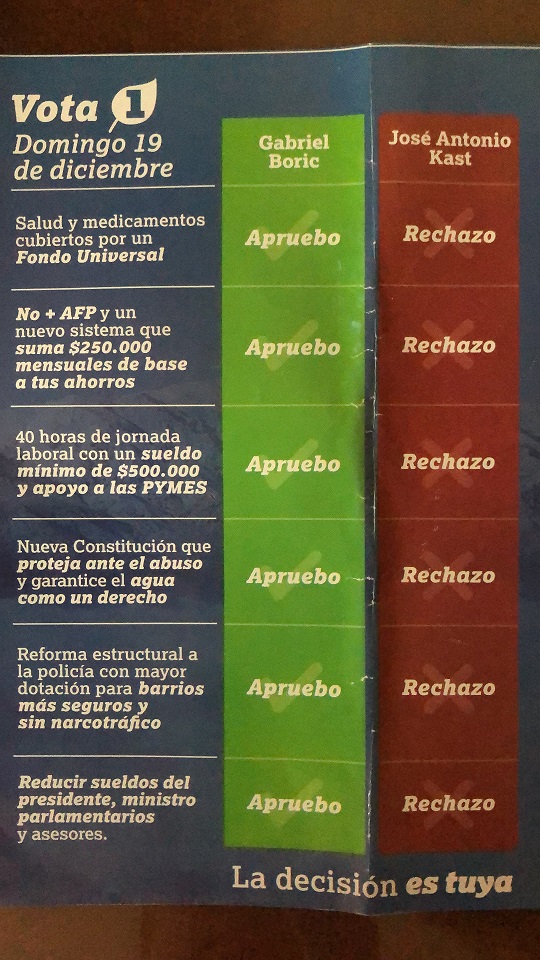
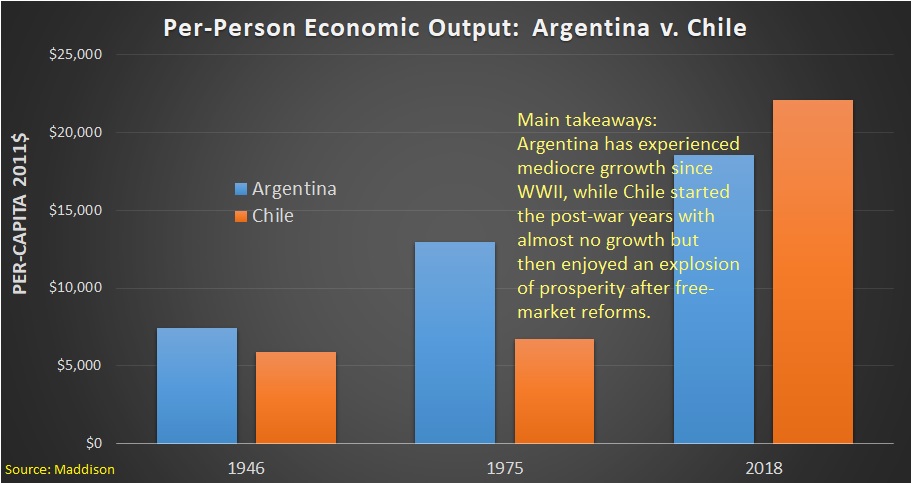
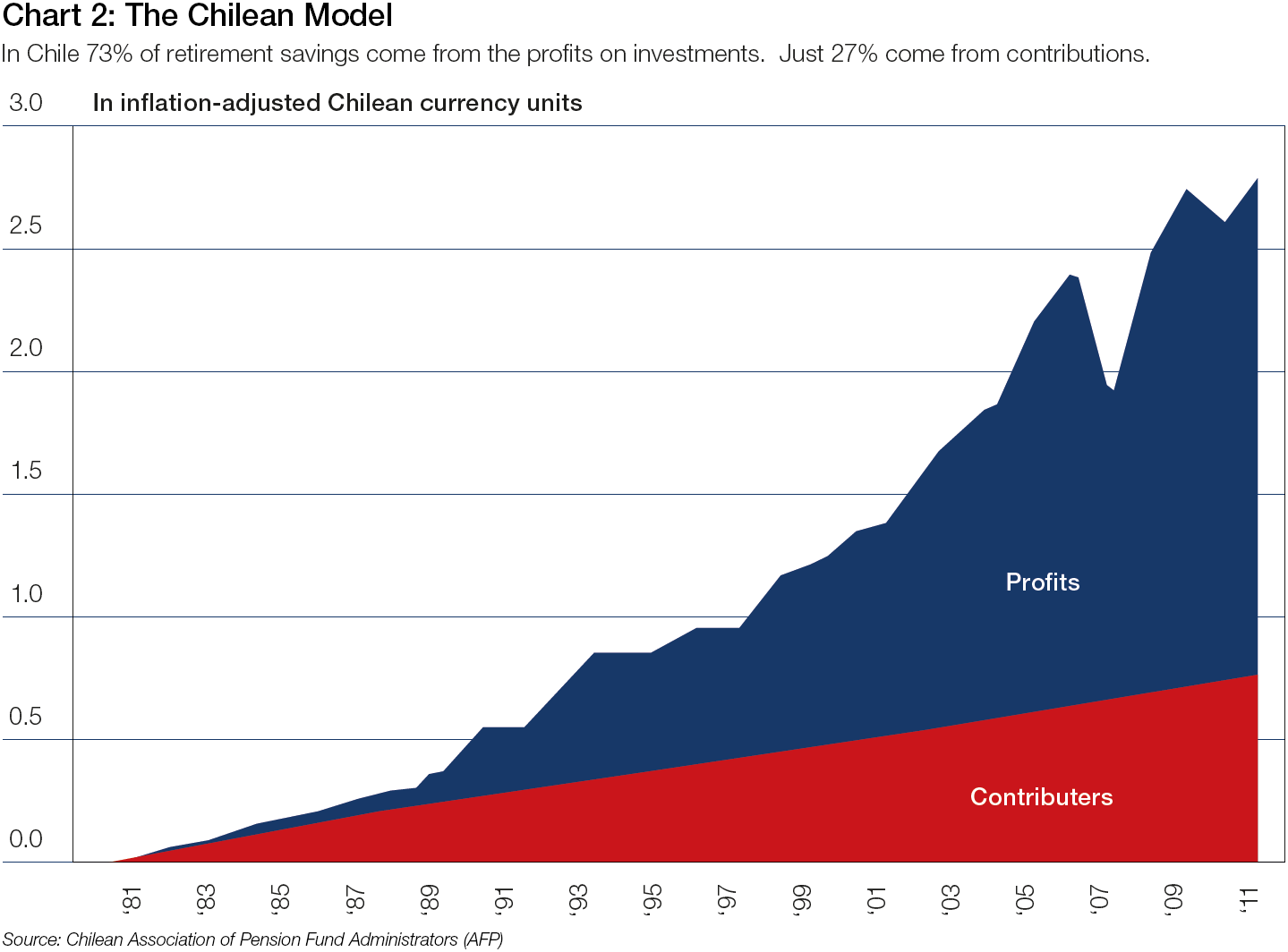
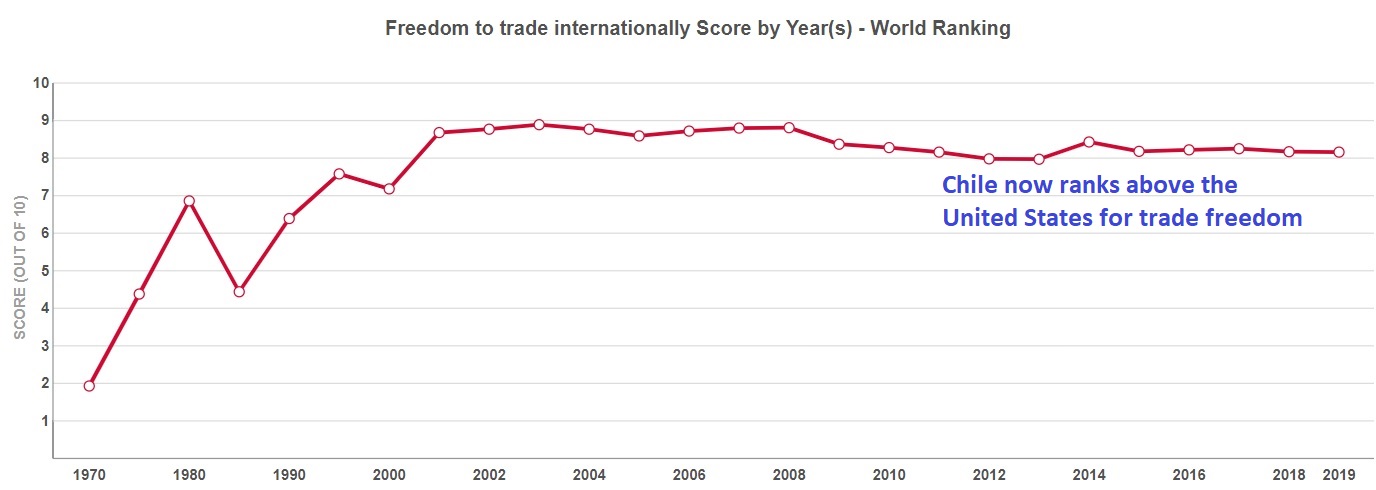
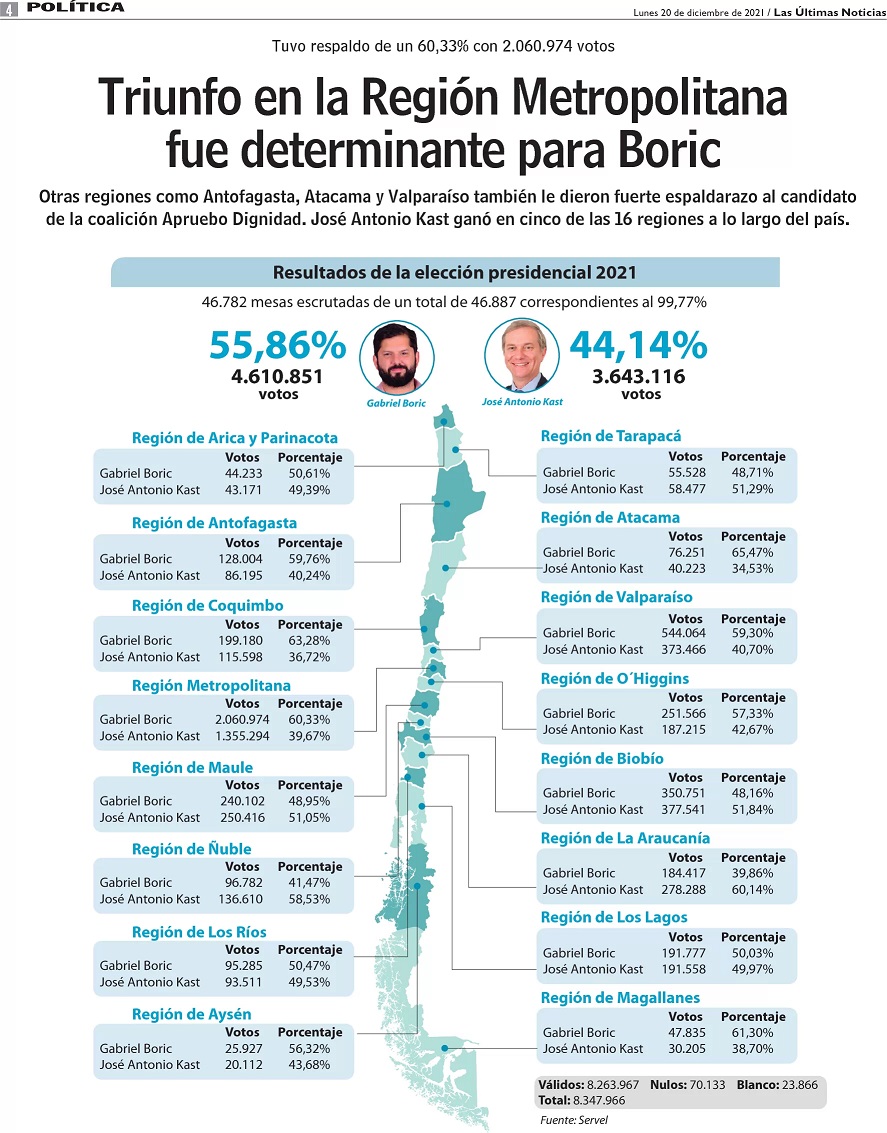
No comments:
Post a Comment